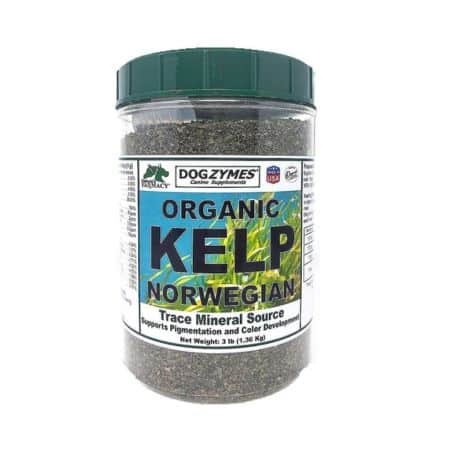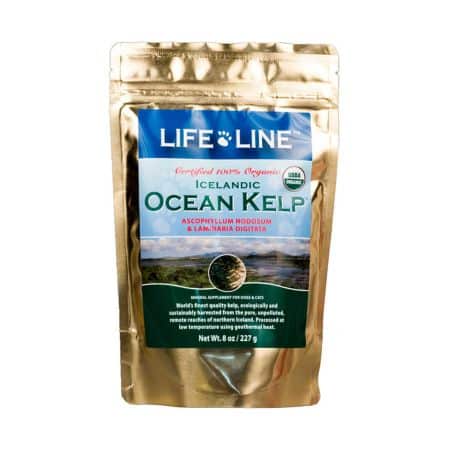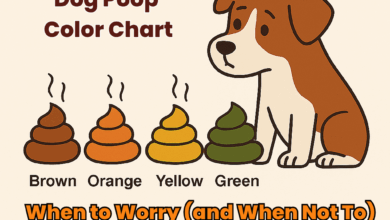The Seaweed Secret That’s Quietly Transforming Dog Health
When you purchase through links on our site, we may earn a commission. Here’s how it works.
Could a scoop of seaweed improve your dog’s breath, skin, and digestion?
Table of Contents
Kelp—a nutrient-dense brown algae from the sea—is showing up in dog food, treats, and supplements for good reason. But is it truly safe for all dogs, or could it cause more harm than help?
Here’s everything you need to know about kelp for dogs: its benefits, the science behind it, how much to give, and when to avoid it.
What Is Kelp & Why Is It In Dog Food?
Kelp (Phaeophyta), a large brown algae, grows rapidly in shallow, cold saltwater oceans and can stretch several feet daily. While it’s often referred to as seaweed, not all seaweed is kelp—there are over 10,000 species of seaweed and only a portion fall into the kelp category.
This nutrient-dense marine organism is widely used in dog food and supplements for various reasons.
In dog food, kelp typically serves two key roles:
- Nutritional booster: Adds protein, fiber, and essential minerals
- Functional ingredient: Acts as a natural thickener or binder
It’s also a popular ingredient in dog supplements—especially those designed to support oral hygiene, healthy skin, and a shiny coat—because of its digestive, dental, and anti-inflammatory benefits.

Is Kelp Good For Dogs?
Yes, when used appropriately. Due to its rich mineral and phytochemical profile, kelp is considered a superfood for both humans and dogs. However, it’s not a one-size-fits-all supplement.
Kelp may support healing and long-term health, especially in these areas:
Metabolism & Thyroid Function
Kelp contains high levels of iodine, which is critical in producing thyroid hormones. These hormones are essential for metabolic health, affecting energy levels, weight regulation, and nutrient absorption. They also help regulate various bodily processes such as heart rate, body temperature, cholesterol levels, breathing, and nervous system activity.
The thyroid works closely with the adrenal and pituitary glands to maintain hormonal balance throughout the body.
Important: Excess iodine can be harmful—especially for dogs with thyroid conditions.
Nutritional Value
This sea vegetable offers:
- 21 amino acids
- Over 60 vitamins and minerals
- Antioxidant and anti-inflammatory support
- Prebiotics for gut health
- Low fat, high protein composition (approximately 25% protein)
It promotes:
- A resilient immune system
- Muscle development
- Healthy digestion and bowel movements
- Healthy hair, skin, and nails
- Strong bones
Dental Health
A 2018 randomized, double-blind, placebo-controlled study found that kelp (Ascophyllum nodosum) significantly reduced plaque in dogs after 90 days of consistent use. This is due to its natural alginic acid content, which disrupts plaque’s ability to stick to teeth.
Kelp also contain Bacillus licheniformis, a bacterium shown to produce enzymes and antimicrobial compounds that help break down tartar and inhibit the growth of harmful oral bacteria.
Research suggests that strains of B. licheniformis isolated from dogs’ mouths may have probiotic potential for improving canine oral health.
Skin, Coat, and Allergy Relief
Kelp’s nutrient density—especially its iodine, calcium, and zinc—can support skin healing and improve coat texture. It helps reduce inflammation and soothe skin irritation, making it a popular choice for dogs with seasonal allergies or food intolerances.
Pet parents often notice fewer hot spots, less scratching, and shinier coats after consistent use.
Stress Reduction & Immunity
Kelp contains minerals like magnesium and selenium, which help regulate blood sugar and support the nervous system. These nutrients contribute to more stable energy levels and may ease physical responses to stress.
Its high antioxidant content also boosts immune function, helping the body defend against environmental stressors and infections.
Cancer-Fighting Potential
Research suggests that polysaccharides in kelp, such as fucoidan and laminarin, may help inhibit the growth and spread of certain cancer cells. These compounds have demonstrated anti-inflammatory, antioxidant, and immune-modulating effects in lab studies.
While not a treatment on their own, kelp-based supplements could offer supportive benefits when used alongside a vet-recommended care plan.
Risks & Side Effects Of Kelp For Dogs
While kelp offers a range of benefits, it isn’t suitable for every dog. Always use the proper dosage when giving seaweed to pets.
Possible Side Effects
Some dogs may react negatively to kelp, particularly if given too much. Common side effects include:
- Vomiting or diarrhea (often linked to iodine excess)
- Signs of hyperthyroidism (increased appetite, weight loss, restlessness)
- Fatigue or sluggishness
- Allergic responses such as itchy skin, hives, or rashes
When To Avoid Kelp
Certain health conditions make kelp supplementation risky or inappropriate:
- Dogs with thyroid disorders (especially hypothyroidism), as excess iodine can interfere with hormone regulation and prescription drug dosages
- Dogs with kidney or liver disease, since kelp contains elevated potassium and can burden these organs
- Puppies under six months old, as their developing systems may be more sensitive to iodine and mineral levels
Watch Out For Contaminants
Because kelp is a bioaccumulator, it absorbs everything in its environment—including toxins like arsenic, lead, and mercury. If sourced from polluted waters, kelp can expose your dog to harmful heavy metals that may affect their liver, kidneys, and nervous system over time.
Always choose products from clean, regulated waters.
Trusted Sources
- Iceland
- Norway
- Canadian Atlantic Coast
Avoid kelp harvested from polluted waters like:
- Indian Ocean
- Northern & Southern Pacific
How To Add Kelp To Your Dog’s Diet
Kelp comes in a variety of formats, allowing you to choose the one that best fits your routine and your dog’s preferences:
- Powder: Easy to measure and sprinkle over wet or dry food; great for daily use
- Granules: A less messy alternative to powder, often more palatable for picky eaters
- Capsules: Offer precise dosing and are convenient for travel or multi-pet households
- Liquid extracts: Simple to mix into food or water; especially helpful for dogs who avoid pills
- Dried seaweed: Can be crumbled over meals or used in homemade treats
Some topical pet care products—like shampoos and sprays—also feature kelp as a key ingredient. When applied externally, these products may help soothe itchy skin, reduce inflammation, and support a healthier, shinier coat.
Our Personal Experience Feeding Kelp To Dogs
I personally use organic kelp granules from Maine Coast Sea Vegetables and occasionally sprinkle a few shakes over my dog’s and cats’ food.
It adds a unique umami flavor they enjoy and provides a simple nutritional boost to support their energy and metabolism.
– Tara Maurer, Animal Lover & Writer For Canine Journal
Dosage Chart (General Guidelines)
| Dog Weight | Kelp Powder |
|---|---|
| Under 20 lbs | 1/4 teaspoon |
| 20-50 lbs | 1/2 teaspoon |
| 50-80 lbs | 1 teaspoon |
| Over 80 lbs | Up to 2 teaspoons |
Note: Always follow the dosage instructions provided by the manufacturer. Because every dog’s health needs are different, it’s essential to consult your veterinarian before introducing kelp—especially if your dog has a thyroid condition, kidney concerns, or is on medication.
Best Kelp Supplement For Dogs
When choosing a kelp product for your dog, prioritize quality and transparency. Look for:
- Single-sourced seaweed (ideally from clean, cold waters)
- USDA-certified organic or equivalent
- No synthetic additives, fillers, or multiple unnamed seaweeds
- Third-party testing for purity and heavy metal content
Nature’s Farmacy Dogzymes Norwegian Organic Kelp
This USDA-certified organic kelp is harvested from Icelandic waters and offers 8% crude protein and 4% fiber. It’s well-suited for adult and senior dogs and is often praised for its palatability and fine grind that blends easily with food.
Raw Paws Organic Kelp Supplement
Made with 100% Norwegian kelp meal sourced from Icelandic waters. It contains 6% protein and 8% fiber, and is a great choice for owners seeking a budget-friendly, organic option with no added ingredients.
Life Line Pet Nutrition Organic Ocean Kelp
USDA-certified organic and sustainably dried with geothermal heat to preserve nutrients. This Iceland-grown kelp is packaged in the U.S. and offers 6% protein and 1.5% fat, with a strong reputation for purity and digestibility.
We typically recommend choosing a kelp product specifically for dogs to ensure appropriate dosing and ingredient safety. Human kelp products may include ingredients not intended for canine use.
Comparison: Kelp vs Spirulina vs Algae Oil vs Fish Oil vs Green-Lipped Mussel
With so many sea- and marine-derived supplements available, it can be challenging to know which is right for your dog.
Each one—whether algae-based like kelp and spirulina or marine-sourced like fish oil and green-lipped mussel—offers distinct health benefits and varies in bioavailability, safety, and function.
Here’s how they compare:
| Supplement | Source | Key Benefits | Watchouts |
|---|---|---|---|
| Kelp | Brown sea algae | Dental health, metabolism, immune support | Iodine overdose risk |
| Spirulina | Blue-green algae (cyanobacteria) | Detox, skin & coat, immune support | Note: not a true algae |
| Algae Oil | Marine microalgae | Vegan source of omega-3s (brain, heart and joint health) | More expensive |
| Fish Oil | Fatty fish (e.g. anchovies, salmon, sardines) | Source of omega-3s (brain, heart and joint health) | Rancidity |
| Green-Lipped Mussel | New Zealand shellfish | Joint support, anti-inflammatory | Shellfish allergies |
Frequently Asked Questions
Here are some of the questions (and answers) our readers ask most often about kelp and canines. Don’t see yours? Ask us in the comments!
Can Puppies Have Sea Kelp?
Puppies can have sea vegetables, but not when they are very young. Wait until they are about six months old. Discuss adding sea vegetables to your puppy’s diet with your vet beforehand.
What Are The Side Effects Of Kelp For Dogs?
While seaweed and algae are beneficial, too much can pose a problem. Signs of too much kelp include upset stomach, lethargy, weight changes, runny nose, and excessive salivation. Stop using and contact your vet if these occur.
More Supplements For Your Pet
Want to support your dog’s health with natural supplements? Multivitamins and probiotics are a great place to start for general wellness. Looking for more targeted care? Check out our reviews of the best supplements for allergies, joints, digestion, and more.






